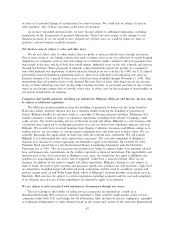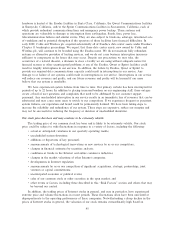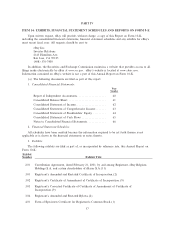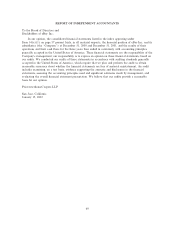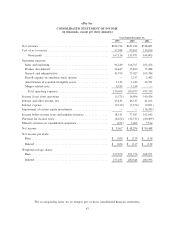eBay 2001 Annual Report Download - page 56
Download and view the complete annual report
Please find page 56 of the 2001 eBay annual report below. You can navigate through the pages in the report by either clicking on the pages listed below, or by using the keyword search tool below to find specific information within the annual report.need to expend signiÑcant resources to protect against security breaches or to address problems caused by
breaches. These issues are likely to become more diÇcult as we expand the number of places where we
operate. Security breaches could damage our reputation and expose us to a risk of loss or litigation and
possible liability. Our insurance policies carry low coverage limits, which may not be adequate to
reimburse us for losses caused by security breaches.
We must keep pace with rapid technological change to remain competitive.
Our competitive space is characterized by rapidly changing technology, evolving industry standards,
frequent new service and product introductions and enhancements and changing customer demands. These
characteristics are worsened by the emerging and changing nature of the Internet. Our future success
therefore will depend on our ability to adapt to rapidly changing technologies, to adapt our services to
evolving industry standards and to improve the performance, features and reliability of our service. Our
failure to adapt to such changes would harm our business. New technologies, such as the development of a
peer-to-peer personal trading technology, could adversely aÅect us. In addition, the widespread adoption of
new Internet, networking or telecommunications technologies or other technological changes could require
substantial expenditures to modify or adapt our services or infrastructure.
We need to develop new services, features and functions in order to expand.
We plan to expand our operations by developing new or complementary services, products or
transaction formats or expanding the breadth and depth of services. We may be unable to expand our
operations in a cost-eÅective or timely manner. Even if we do expand, we may not maintain or increase
our overall acceptance. If we launch a new business or service that is not favorably received by consumers,
it could damage our reputation and diminish the value of our brand. We anticipate that future services will
include pre-trade and post-trade services.
We are pursuing strategic relationships with third parties to provide many of these services. Because
we use third parties to deliver these services, we may be unable to control the quality of these services,
and our ability to address problems if any of these third parties fails to perform adequately will be reduced.
Expanding our operations in this manner also will require signiÑcant additional expenses and development,
operations and other resources and will strain our management, Ñnancial and operational resources. The
lack of acceptance of any new services could harm our business.
Our growth will depend on our ability to develop our brand.
We believe that our historical growth has been largely attributable to word of mouth. We have
beneÑted from frequent and high visibility media exposure both nationally and locally. We believe that
continuing to strengthen our brand will be critical to achieving widespread acceptance of our service.
Promoting and positioning our brand will depend largely on the success of our marketing eÅorts and our
ability to provide high quality services. In order to promote our brand, we will need to increase our
marketing budget and otherwise increase our Ñnancial commitment to creating and maintaining brand
loyalty among users. Brand promotion activities may not yield increased revenues, and even if they do, any
increased revenues may not oÅset the expenses we incurred in building our brand. If we do attract new
users to our service, they may not conduct transactions over our service on a regular basis. If we fail to
promote and maintain our brand or incur substantial expenses in an unsuccessful attempt to promote and
maintain our brand, our business would be harmed.
We may be unable to protect or enforce our own intellectual property rights adequately.
We regard the protection of our trademarks, copyrights, patents, domain names, trade dress and trade
secrets as critical to our success. We aggressively protect our intellectual property rights by relying on a
combination of trademark, copyright, patent, trade dress and trade secret laws and through the domain
name dispute resolution system. We also rely on contractual restrictions to protect our proprietary rights in
products and services. We have entered into conÑdentiality and invention assignment agreements with our
52


